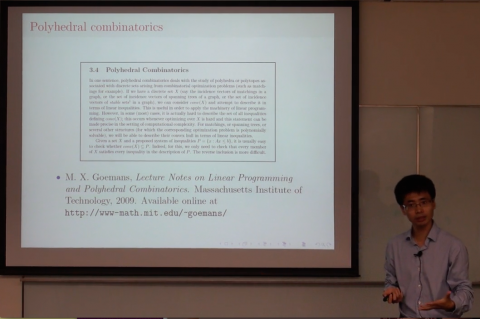
Polyhedral combinatorics refers to the problems of establishing the equivalence between a parametric description and a (canonical) half-space representation of a given (high dimensional) polyhedron. This talk discusses two polyhedral combinatorics problems arising naturally from the context of network information theory: one on characterizing the latency capacity region of broadcast channels, and the other on characterizing the symmetrical projections of the entropy regions. These two examples highlight the fact that network information theory is not only an ample source of interesting polyhedral combinatorics problems, but also sheds important insight on the solutions of these problems.
Tie Liu was born in Jilin, China in 1976. He received his B.S. (1998) and M.S. (2000) degrees, both in Electrical Engineering, from Tsinghua University, Beijing, China and a second M.S. degree in Mathematics (2004) and Ph.D. degree in Electrical and Computer Engineering (2006) from the University of Illinois at Urbana-Champaign. Since August 2006 he has been with Texas A&M University, where he is currently an Associate Professor with the Department of Electrical and Computer Engineering. His primary research interest is in understanding the fundamental limits of communication and cryptographic systems via the lens of information theory and leveraging these understanding into efficient engineering designs.
Dr. Liu received an M. E. Van Valkenburg Graduate Research Award (2006) from the University of Illinois at Urbana-Champaign and a Faculty Early Career Development (CAREER) Award (2009) from the National Science Foundation. He was a Technical Program Committee Co-Chair for the 2008 IEEE Global Communications Conference (GLOBECOM) and a General Co-Chair for the 2011 IEEE North American School of Information Theory. He currently serves as an Associate Editor for Shannon Theory for the IEEE Transactions on Information Theory.
